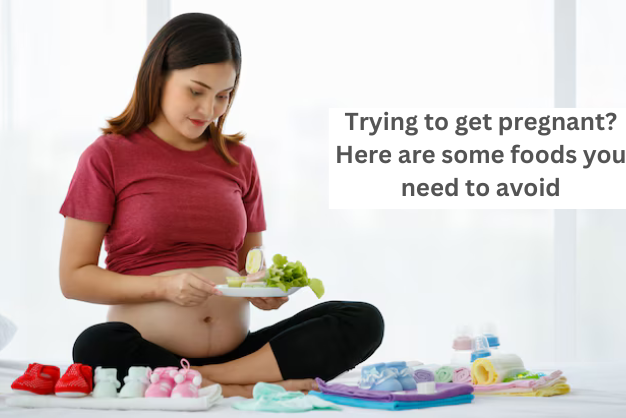Trying to get pregnant? Here are some foods you need to avoid
When you’re trying to conceive, maintaining a healthy diet is essential. What you eat can significantly affect your fertility and overall reproductive health. While focusing on nutrient-dense foods is crucial, there are certain foods and substances that can hinder your chances of getting pregnant. At New World Fertility Centre, we believe that making smart dietary choices can support your fertility journey. Here's a guide on foods you should avoid while trying to get pregnant:
Why Diet Matters
A healthy diet can help to improve your overall health and fertility. Eating a balanced diet that is rich in nutrients can help to regulate your hormones, improve egg quality, and increase your chances of getting pregnant.
Foods to Avoid
Here are some foods that you should avoid or limit when trying to conceive:
1. Processed Foods
Processed foods are often high in unhealthy fats, sodium, and sugar. These ingredients can disrupt your hormones and increase inflammation, both of which can negatively impact fertility.
2. Trans Fats
Trans fats are found in many processed foods, such as margarine, baked goods, and fried foods. Trans fats can increase inflammation and lower your good cholesterol levels, both of which can harm fertility.
3. Excessive Caffeine
While moderate caffeine intake is generally safe, excessive caffeine consumption can negatively impact fertility. High caffeine intake has been linked to irregular ovulation and decreased sperm quality.
4. Alcohol
Alcohol can disrupt your menstrual cycle and reduce fertility. It can also harm the developing fetus if you become pregnant.
5. Raw or Undercooked Foods
Raw or undercooked meat, poultry, and seafood can contain harmful bacteria that can cause food poisoning. Food poisoning can lead to fever, diarrhea, and dehydration, all of which can negatively impact fertility.
6. Soy Products
Some studies have shown that soy products may interfere with fertility. However, more research is needed to confirm this link.
7. Excessive Sugar
Consuming too much sugar can lead to weight gain, insulin resistance, and inflammation, all of which can harm fertility.
Foods to Eat
In addition to avoiding certain foods, it's important to eat plenty of nutrient-rich foods. Here are some foods that can help to boost your fertility:
Fruits and vegetables: Fruits and vegetables are packed with vitamins, minerals, and antioxidants that are essential for fertility.
Whole grains: Whole grains are a good source of fiber, which can help to regulate your hormones.
Lean protein: Lean protein is important for building and repairing tissues.
Healthy fats: Healthy fats, such as those found in avocados, nuts, and seeds, can help to regulate your hormones.
Tips for a Healthy Diet
Here are some tips for eating a healthy diet to boost your fertility:
Cook at home: Cooking at home allows you to control the ingredients in your food.
Read food labels: Pay attention to the ingredients and nutritional information on food labels.
Eat regular meals: Eating regular meals can help to regulate your blood sugar levels.
Stay hydrated: Drink plenty of water throughout the day.
Consider a fertility diet: A fertility diet is a specialized diet that is designed to improve fertility.
Conclusion
When trying to get pregnant, it’s important to not only focus on what you should eat but also be mindful of what you avoid. Avoiding harmful foods and substances can help improve your chances of conception and promote a healthy pregnancy. At New World Fertility Centre, we encourage you to adopt a balanced, nutrient-rich diet that supports your fertility and overall well-being. Always consult with your fertility specialist or nutritionist to create a plan that works best for your body and reproductive health.
Frequently Asked Questions (FAQs)
1. Why should I avoid processed foods when trying to get pregnant?
Processed foods are often high in unhealthy fats, refined sugars, and artificial additives that can disrupt your hormonal balance and contribute to inflammation in the body. This can negatively affect your reproductive health. Instead, focus on whole, nutrient-dense foods to support hormonal health and fertility.
2. How does caffeine affect fertility?
Excessive caffeine intake has been linked to reduced fertility and increased risk of miscarriage. Caffeine can interfere with ovulation and may lower a woman’s chances of conceiving. It’s best to limit caffeine to 200–300 milligrams per day, which is roughly equivalent to one cup of coffee.
3. What are trans fats, and why should they be avoided?
Trans fats are artificially created fats found in foods like fried items, packaged snacks, and baked goods. These fats can cause insulin resistance, weight gain, and hormone disruption, all of which can negatively affect fertility. Replace trans fats with healthy fats, such as those found in avocados, nuts, and olive oil.
4. Which fish should I avoid due to mercury?
Fish such as shark, swordfish, king mackerel, and tilefish are high in mercury, which can harm fertility and affect fetal development. Instead, opt for low-mercury fish like salmon, sardines, and trout, which provide essential omega-3 fatty acids for reproductive health.
5. How does alcohol impact fertility?
Excessive alcohol consumption can affect both male and female fertility. For women, it may disrupt ovulation, while for men, it can lower sperm quality and motility. To improve fertility, it’s advisable to avoid alcohol or consume it in moderation.

 Nov-14-2024
Nov-14-2024